
Why Listening to Stories and Talking About Them is So Important for Young Children
Guest post by Fufy Demissie,
Senior Lecturer in Early Years Education,
Sheffield Hallam University.
First published in The Conversation
Story time – at home, at nursery and at school – is where young children encounter the magic of books. Reading stories to young children is a pleasurable activity in itself, but it also lays the foundation for language and literacy development and has social and emotional benefits.
What’s more, research for decades has shown a clear difference in the language skills of children who had story time at home and those who didn’t.
Parents and teachers can further expand the benefits of story time by getting children involved in what’s known as dialogic reading – engaging in conversations about stories. This means using questions to get children talking about the book. This talk can deepen children’s knowledge and understanding, and help them learn about language. It can include asking what children remember about plot points to encourage their recall of the book, and asking “why” questions about characters’ choices.
A wealth of evidence has highlighted the significance of these kind of conversations during story time. It has benefits for reading enjoyment, reading motivation, parent-child attachment and parental confidence.
Dialogic reading affects children’s vocabulary as well as their literacy outcomes. One particular study divided 36 children with vocabulary delays into groups taking part in shared reading or shared dialogic reading. While both groups showed improvements, the dialogic reading group had significantly larger gains in vocabulary.
It has benefits for reading enjoyment, reading motivation, parent-child attachment and parental confidence.
Language and communication is a prime area of the early years foundation stage in England – the guidelines for the education and development of children aged from birth to five. What’s more, the practice of dialogic reading is a valuable way to develop young children’s “oracy” – the ability to articulate ideas when speaking, listen carefully and communicate effectively.
However, curriculum pressures can make it difficult for teachers to prioritise story time at school. Policy directives that prioritise decoding skills – reading instruction that focuses on the ability to understand how letters and groups of letters represent sounds. This leaves less time for the development of oracy skills.

Oracy education
In 2024, the Oracy Commission, an independent body campaigning to embed oracy across the curriculum, published a report highlighting oracy’s importance. It pointed out that oracy prepares young children and pupils for the demands of their future lives: it’s needed to give a presentation, argue an idea, and take part confidently in university seminars and work meetings. The report noted that access to high-quality oracy education is not universal.
Oracy in education was a key part of the current Labour government’s election manifesto. But its absence from the interim report of an ongoing review into curriculum and assessment has campaigners worried.
My research project Talk with Tales for Children has worked to improve early years teachers’ skills in using dialogic reading techniques with three- and four-year-olds. The programme uses traditional tales, such as Goldilocks and the Three Bears. In addition to questions such as “what can you see on this page?” and “what happened next?”, practitioners are also encouraged to ask questions that provoke childrens’ thinking. These include “would it be good or bad to eat someone else’s porridge?” and “was Goldilocks brave?”
The early findings suggest that high-quality training through this programme has improved early years teachers and practitioners’ interactions during shared reading and enhanced childrens’ listening and attention, thinking skills and enjoyment of and engagement with stories.
The language, social, and emotional benefits of story time mean it should be seen as a fundamental part of the early years curriculum – rather than a luxury or an add-on.
RECEIVE THE NEXT BILINGUALISSIMO EPISODES
IN YOUR INBOX FREE
Practical Tips for Success
- Make Story Time a Daily Habit – Prioritise daily reading at home, nursery or school to build language, literacy, and emotional bonds from an early age.
- Embrace Dialogic Reading – Encourage children to talk about the story by asking open-ended questions that spark discussion and curiosity.
- Ask Thought-Provoking Questions – Go beyond the basics – ask “why” and “what if” questions to deepen children’s understanding and thinking.
- Focus on Oracy Development – Use story time to develop children’s speaking and listening skills – essential for school, work and life success.
- Train Educators in Dialogic Techniques – Provide professional development for early years staff in dialogic reading to boost engagement and improve outcomes.
- Use Traditional Tales as Teaching Tools – Classic stories like Goldilocks can prompt rich conversation and moral reflection when paired with strong questioning.
- Value Story Time in the Curriculum – Treat shared reading as essential to early years education, not just a treat or time filler – it’s foundational for learning.

